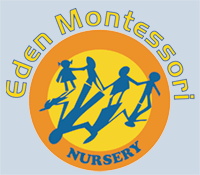There are eight key stages of development in our curriculum:
1. Everyday living (practical life)
This stage in our curriculum establishes a link between the home and nursery. The various activities carried out by the children teach them how to care for their environment and to contribute towards the cultural and social life of the classroom. Everyday living activities aid the children's intellectual growth and develop their co-ordination in movement, balance and grace.
These activities are divided into four main areas:
- Activities for refinement of movement – such as pouring, transferring, cutting, gluing, folding, opening and closing and threading.
- Activities for care of the environment – such as sweeping, polishing, dusting, putting their activity away and watering the plants.
- Activities for care of self e.g. washing hands, blowing nose, putting on simple clothing, preparing snack.
- Activities for promoting grace and courtesy such as greeting visitors.
All the above will perfect skills that will aid to the child’s independence.
2. Communication and language
This stage of development involves providing children with opportunities to experience a rich language environment. The Montessori language materials are extensive and assist the children to develop confidence and skill in expressing themselves, and to speak and listen in a range of situations. It also prepares them for writing.
3. Sensorial materials
A child’s first learning experiences are achieved through their senses of touch, taste, smell and hearing. The sensorial materials provide opportunities to use these senses. They develop the children's level of observation and discrimination, and increase their vocabulary
4. Mathematics
Mathematics involves the introduction to pre-maths concepts such as sorting, matching and counting. The Montessori maths materials offer a systematic approach to learning through the use of objects, while slowly helping the child in understanding and using numbers, calculating simple addition and subtraction problems, and describing shapes, spaces and measures.
5. Literacy
Literacy development involves teaching and encouraging children to link sounds and letters and to begin to read and write. The children have access to a wide range of materials to support their development in this area.
6. Understanding the world
This area of development offers opportunites for the children to explore a wide range of topics through activities and materials based on real-life experiences. They are able to make sense of their physical world and their community by further exploration and investigation during our many educational trips.
7. Physical
This development takes place through activities such as dancing and drama. We invite specialists to lead music and drama activities with the children.
8. Expressive arts and design
Children are given opportunities to use and experiment with a wide range of media and materials. They are also encouraged to share their thoughts, ideas and feelings through a variety of activities in art, music, movement, dance, sports, role play and design and technology.
